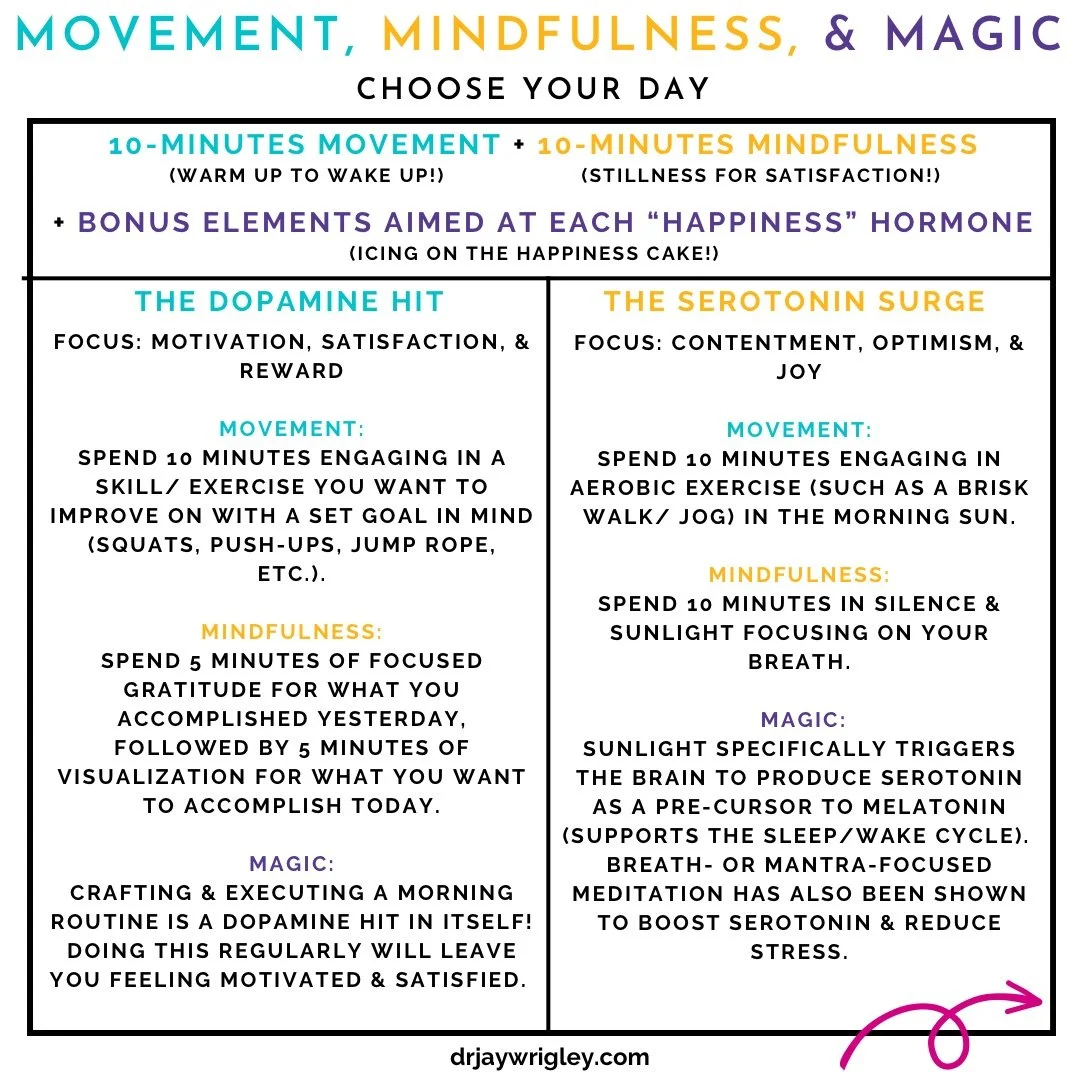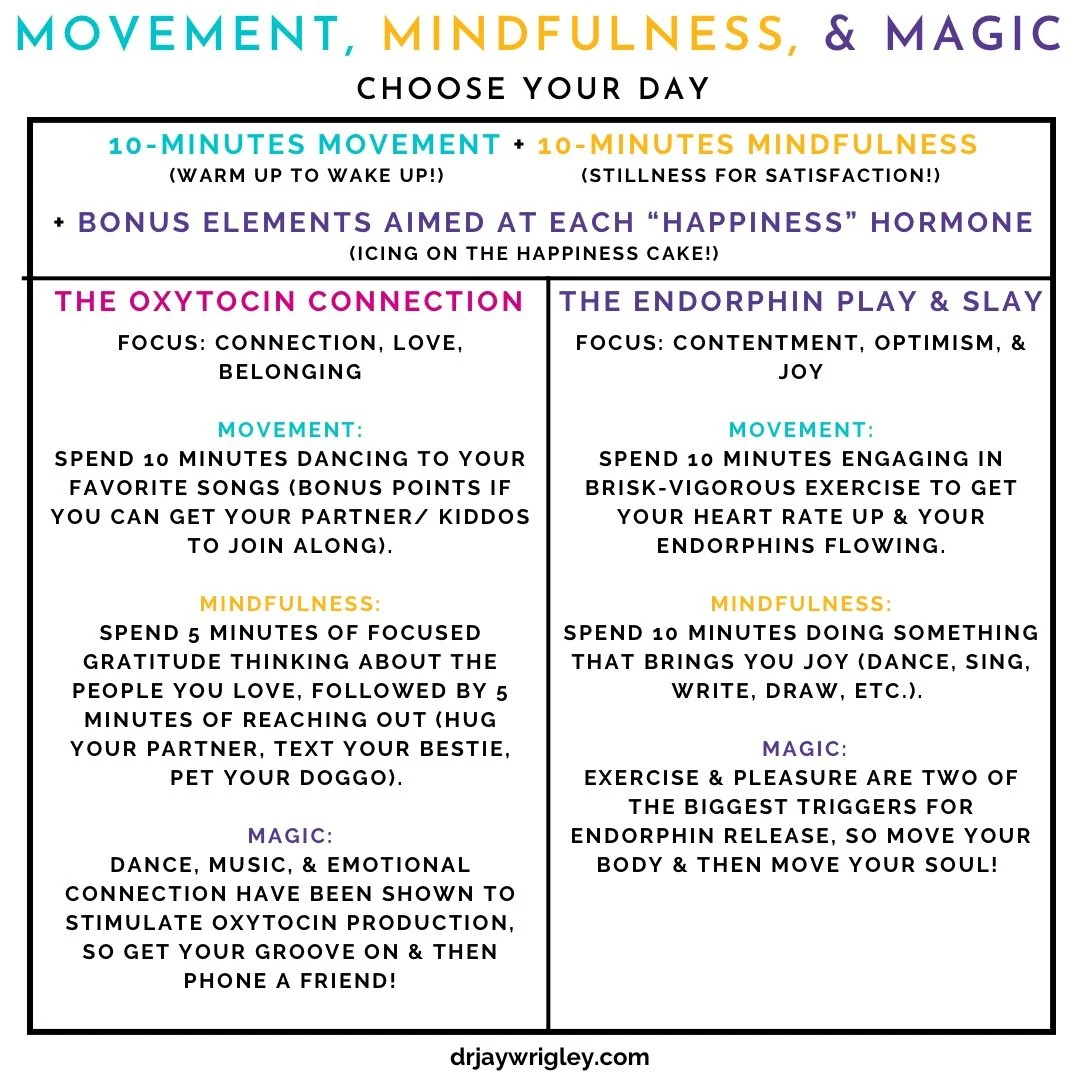The Secret to Happiness: How To Use Your Hormones To Boost Your Mood and Better Your Life
So What are “Happiness Hormones?”
The “Happiness Hormones” - Dopamine, Serotonin, Oxytocin, and Endorphins - are a group of hormones associated with boosting our moods and stimulating feelings of pleasure, reward, and joy (although they do all of that and more!).
These hormones have a profound impact on both physical and mental health, so let’s dive in to what they are, what they do, and how you can best tap into them to improve your body, mind, and outlook day-to-day.
BONUS: stay to the end to learn how you can use these hormones to create your ultimate frequency-boosting morning routine!
Dopamine: The “Feel Good” Hormone
Dopamine is a hormone and neurotransmitter (i.e., “chemical messenger”) that is responsible for allowing you to feel motivation, pleasure, and satisfaction. When you feel good after accomplishing a goal or nailing a task, that surge of excitement and feeling of reward . . . that’s Dopamine.
But Dopamine isn’t a one stop shop! It also plays an important role in multiple biological functions, including cognition, learning, memory, memory, movement, and sleep. And it can help offset depression and anxiety by providing a boost of energy when you’re feeling less than stellar. When you have ideal levels of Dopamine in your system, you’ll feel happy, alert, focused, and raring to go.
Dopamine is released when you experience something pleasurable or rewarding, like eating delicious food, going to a concert, winning a game, being praised by a boss, or having great sex. But Dopamine is also a motivator - it helps you remember and repeat those experiences in order to feel that same pleasure again. It pushes you toward more of the activities that feel good and encourages you to take action on your goals.
There are several natural ways to boost your Dopamine levels:
Avoid processed junk food and sugar. While these foods can spike Dopamine - mmm, doughnuts - they can lead to cravings for more junk and create a pattern of unhealthy eating habits.
Eat foods rich in L-Tyrosine (the protein needed to make Dopamine), such as meat, fish, eggs, yogurt, cottage cheese, & avocados.
Supplement with high-quality Magnesium Glycinate. Magnesium can help increase Dopamine levels by activating the enzyme Tyrosine Hydroxylase, which helps synthesize Dopamine from its precursor molecule Tyrosine. Magnesium Glycinate is our recommended form as it is highly absorbable and does not have some of the unpleasant laxative effects of other forms.
Prioritize sleep. Dopamine helps regulate your sleep-wake cycle, as well as the amount of time you spend in deep and REM sleep. Insufficient Dopamine levels can lead to difficulty falling or staying asleep and feeling tired during the day. High Dopamine levels can lead to restlessness and difficulty concentrating.
Exercise regularly. Exercise has been found to be an effective way to increase the levels of ALL of the “happiness” hormones.
Practice stress management. Stress can deplete your Dopamine levels quickly, but certain techniques like meditation, mindfulness, and breathwork have been shown to both combat stress and stimulate your Dopamine production.
Serotonin: The “Happy” Hormone
Serotonin is a mood regulator - this hormone and neurotransmitter helps boost your mood and energy levels. It also helps level out your Cortisol (the “stress” hormone) levels, ease anxiety, and increase overall feelings of happiness.
But, like Dopamine, Serotonin is no one stop shop: research indicates that up to 95% of your body’s Serotonin is produced and stored in the gut, making it a key player in digestive health. It plays a role in appetite, metabolism, and controlling nausea and bowel movements. It also supports optimal sleep and bone health + lifts up your libido!
One of Serotonin’s jobs is to regulate your emotional responses to the situations around you, meaning it can be released in moments of pleasure or stress. The goal is to have sufficient levels of Serotonin in your body to steer you away from depression and anxiety and toward optimism and confidence.
There are several natural ways to boost your Serotonin levels:
Avoid processed junk food and sugar. Similar to Dopamine, these foods can spike Serotonin levels, but it’s a temporary “high.” Over time, you’ll experience more cravings and a decrease in Serotonin production.
Eat foods rich in L-Tryptophan (the protein needed to make Serotonin), such as meat, fish, and eggs.
Pay attention to your gut health. Serotonin and digestion are intricately linked. Serotonin is associated with many aspects of digestion, including the absorption of nutrients, the regulation of appetite and food take, and the maintenance of intestinal integrity . . . so if your gut is “off,” your Serotonin levels might be too.
Get 15+ minutes of sunshine per day. Sunlight is essential for the production of Serotonin in the body. Sunlight helps to convert Vitamin D in the skin into its active form, which then helps to increase Serotonin levels in the brain.
Prioritize sleep. Serotonin also helps regulate your sleep-wake cycle, and it acts as the precursor to Melatonin (the hormone responsible for inducing sleep). Insufficient Serotonin levels can lead to insomnia or restless sleep.
Exercise regularly. Exercise has been found to be an effective way to increase the levels of ALL of the “happiness” hormones.
Practice stress management. Stress is one of the most common causes of Serotonin deficiency. When stress levels increase, the body produces more Cortisol and Adrenaline. These hormones interfere with Serotonin production and can lead to feelings of anxiety, depression, irritability, fatigue, and difficulty concentrating.
Oxytocin: The “Love” Hormone
Oxytocin is the hormone and neurotransmitter associated with social bonding, relationship building, and love. It has been linked to reduced stress, improved communication and trust between partners, increased sexual desire, and overall better relationship satisfaction.
For women, Oxytocin plays a large part in childbirth and breast-feeding, both in stimulating the physical mechanisms of both processes and in fostering the bond between mother and child. (Low Oxytocin levels have been linked to post-partum depression). In men, it plays a role in sexual arousal and ejaculation and can also create feelings of bonding between father and child. It also impacts both sexes’ social interactions, guiding how we pick and choose the people who get to be in our “inner circle.”
Oxytocin is released from the pituitary gland in response to connection, and there are a number of ways to naturally boost your “love” levels:
Avoid processed junk food and sugar. Studies show that Oxytocin plays a positive role in eating behavior, energy balance, and metabolism. So focus on the foods and activities that boost your Oxytocin, so it can do it’s part in regulating your appetite and cravings.
Eat protein-rich foods. Oxytocin is a peptide made of nine amino acids, meaning - yet again - protein is KING. Prioritize meat, eggs, and fish for the win.
Engage in physical contact. Ask someone for a hug, gift yourself a massage, pet a dog (it boosts their Oxytocin too!), or get it on with someone you love. (Ahem: solo orgasms also count, so you do you.)
Engage in emotional connection. If your vibrator’s dead and your house is empty, you can engage in emotional connection. This can be as simple as 5 minutes of gratitude centered around someone you love or an e-mail, text, or phone call to your bestie.
Prioritize snuggling. One of Oxytocin’s roles is to regulate the effects of Cortisol (the “stress” hormone) on the body. So if you want to relax more easily, fall asleep faster, and improve the quality of your sleep, cuddling and snuggling before bed is the key to sweet dreams.
Exercise regularly. Exercise has been found to be an effective way to increase the levels of ALL of the “happiness” hormones.
Dance to the music! Music has been shown to stimulate the production of Oxytocin, so turn the volume up while you listen, sing, or dance along to the rhythm.
Endorphins: The “Painkillers”
Endorphins are hormones and neurotransmitters that act as natural painkillers and provide a feeling of euphoria and wellbeing. They also help to reduce stress, combat depression and anxiety, boost energy, reduce inflammation, improve sleep, enhance immunity, and support cardiovascular health by lowering blood pressure and improving circulation.
Endorphins are produced in response to physical activities such as exercise; they can also be released in response to pleasure or stress. Healthy Endorphin levels steer you away from negative thinking and overwhelm and direct you toward a confident, optimistic mindset.
There are several natural ways to boost your Endorphin levels:
Avoid processed junk food and sugar. Endorphins are released when we eat food we enjoy - junk or not junk. Avoid creating unhealthy eating patterns by focusing on food you enjoy that’s ALSO good for you.
Eat protein-rich foods. Like Oxytocin, Endorphins are peptides made of multiple amino acids: so protein, protein, protein.
Exercise regularly. While exercise effectively increases the levels of all of the “happiness” hormones, it’s very strongly associated with its ability to stimulate Endorphin production. So take a walk, go for a swim, or lift heavy things.
Do what you love! Endorphins are stimulated by both pleasure and stress, so dig deep into your playful side for an Endorphin boost. Listen to music, eat dark chocolate, or engage with someone who makes you belly laugh.
Do who you love! Intimate contact, sex, and orgasms in a safe, loving space are guaranteed to leave you feeling euphoric.
Have A Happy Morning, Every Morning
As you can see, there are activities that can be used to boost multiple of - if not all of - the “happiness” hormones at once. For the day-to-day, focus on this foundation: prioritize protein at each meal; exercise; go outside; manage your stress; indulge in pleasure, play, and connection; and get quality sleep. Once these activities become habits, you’ll be well on your way to feeling like your happiest self.
But what if we took it a step further? Take a look at the infographics below to learn how you can create a short, effective morning routine aimed at stimulating these specific hormones, making every day a healthy, happy day.
The Movement, Mindfulness, & Magic Morning Routine (Options #1-4)


